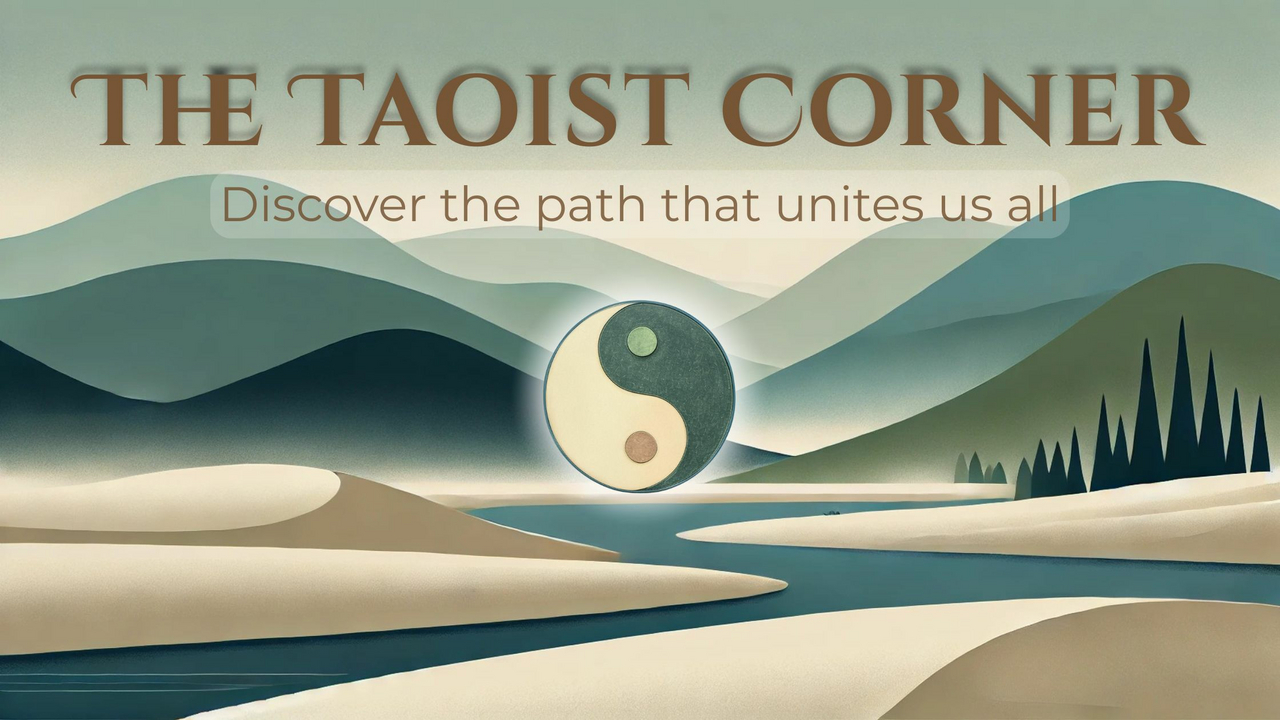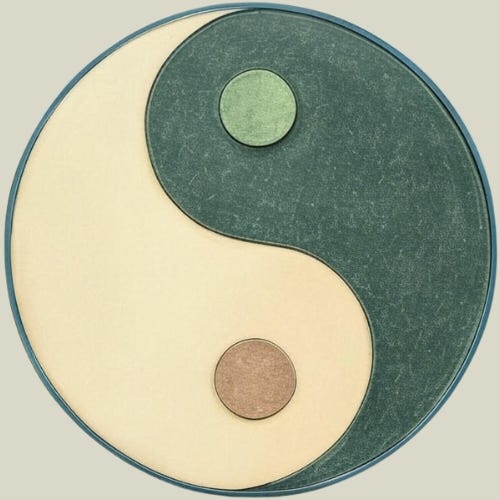The Art of Letting Go And Moving On
Chapter Two of Tao Te Ching shows why I ruined my first relationship.

I like to think of myself as an intelligent person. I’m a college graduate with a bachelor of arts degree with a major in rhetorical communication. I’ve studied art, performance, and public speaking, and I am an excellent trivia player. One of my favorite pastimes was browsing Wikipedia, learning everything I could about a movie I had just watched, a historical event, or a celebrity. However, after studying and performing art for several years, I could not understand Chapter 2 of Tao Te Ching. I still remember the first copy of Tao Te Ching I bought, Stephen Mitchell’s interpretation, skipping the introduction, and diving right into the Tao.
As I read Chapter 1, I knew something was off. What was darkness within darkness? I had questions immediately, and no one around had ever heard of Taoism or the Tao. So, I did what anyone would do: I skipped Chapter 1 and moved on, but Chapter 2 was worse!
Like always, understanding what can’t be fully understood is complicated. For example, my first relationship, when I was a teenager, did not go well. I felt lost and confused by her decisions, actions, and needs. I couldn’t understand her past behavior or make the connection to her current behavior. It wasn’t until much later that I realized my part in the downfall of our relationship was due to my controlling nature. I spoke at length about how I thought the relationship should work and how a man and a woman should behave because she was so wild, and her past was so shocking. That’s what I found so attractive, yet appalling. I remember long conversations into the night, debating our pasts and trying to use words to explain our relationship.
Sometimes, a successful relationship is something you learn by feeling, not by talking. You and your partner connect on a deeper level that isn’t describable through words, but you know it’s there. You allow each other space to be who you are and become one. It works by not working. The relationship flourishes by doing what comes naturally for and with each other.
This is Chapter 2 of Tao Te Ching.
I’ll use the translation by Brian Bruya, as it opens the meaning for new readers.
Let’s get into it.
When people realize what beauty is,
the concept of ugliness arises as well.
When people realize what goodness is,
the concept of badness arises also.
In the first two verses, we find Laozi describing a duality— something that can be described in two parts yet is the same. Does this remind you of anything? That’s right! Yin and Yang.
If you have read my article, Chaos and Cycles, I explained that Yin and Yang are two separate concepts, yet the same entity. Just as a coin requires two sides, heads and tails, so too do beauty and ugliness. They must coexist at the exact same time. How can we describe what is beautiful if not also explain what is ugly? When we define one, we immediately and unintentionally define the other. Goodness and badness work similarly since we can not determine what is good without specifying what is bad. No one can always be good. It’s impossible. One without the other is impossible.
Being and nothing produce each other.
Easy and difficult create each other.
Long and short reveal each other.
High and low support each other.
Sound and voice harmonize with each other.
Front and back follow each other.
Of the several examples Laozi lists, my favorites are being and nothing and front and back. Do you remember not existing before you were born? I don’t. Some may remember past lives, but that’s also existing. We only remember existing, never not existing. Yet, at one time, for billions of years, we did not exist, but it happened instantly. So, too, will our future be instant. It’s only now during existence that time moves slowly enough to remember. However, we would not exist without billions of years of non-existence, and we can not return to non-existence without existing now. The duality of life— death, life, death. If Tao cycles forever, so too must we. But this is a much longer discussion, and I won’t unpack it today.
I find '“Front and back follow each other” amusing, and it makes me laugh! For some reason, every time I read it, I imagine this blob of a person who is somehow the front and back of a human in a massive, fleshy, lumbering thing! It just stands there spinning in circles since front and back are always trying to overtake the other. I probably watch too many horror movies because I can picture this spinning, fleshy blob with fantastic detail! For the next verse, I want to look at Gia-Fu Feng and Jane English’s translation and Brian Bruya’s.
Gia-Fu Feng and Jane English
Therefore the sage goes about doing nothing, teaching ‘no-talking.’
The ten thousand things rise and fall without cease,
Brian Bruya
So, the sages act without doing and teach without speaking.
All things do their thing without it being put into words.
I list both because each translation opens a different aspect of alternating verses. When you read the word sage, think expert or master— the wisest of all people. Knowing duality, what actions do sages perform? No action. No speaking. No forcing their will upon any situation or discussion. The sage allows all things (10,000 things) to live naturally. When you read ten thousand things, think about how we like to assign unimaginably large numbers to a situation. “Did you see those birds in the sky? There was like, a million of them!” There probably weren’t one million birds, just a lot of them.
Gia-Fu Feng and Jane English
Creating, yet not possessing,
Working, yet not taking credit,
Work is done, then forgotten.
Therefore it lasts for ever.
Brian Bruya
There is creation without ownership.
Action without presumption.
Accomplishment with arrogance.
It is because they don’t dwell on their successes that they are not forgotten.
Can you create art without controlling its meaning? When I was in college, we looked at paintings and sculptures, watched videos, performed skits, and then openly discussed their meaning with each other. I only made the mistake of explaining my skit once to my professor. The class discussed what a certain action meant, and after a few people spoke and their interpretations didn’t match my original meaning, I explained it. My professor turned and shot me a hateful glair, “Thanks art professor. Maybe next time let the other adults believe what they want. Art works better than way.” I looked at the floor for the rest of the discussion.
Looking back, it’s clear I attempted to possess my work and control the narrative around my art. Rather than putting it into existence and letting it grow on its own, I tried to force my will into my art. Of course, the creator has an opinion; he created it for a reason. But why is the creator’s opinion more valued or correct than the viewer’s? Does the viewer not deserve the ability to choose or decide? Of course, they do!
I felt proud of that performance that day, just as I felt proud of the children I’m raising and the wife I spend my life with. When I help my kids accomplish tasks, I don’t gloat about how they couldn’t have done it without me. I simply move on to the next task they might need help with. Masters, or sages, live their entire lives this way. Sages can accomplish amazing, wonderful, and impactful things, yet they never speak of them. Masters simply move on to whatever needs to be done next. These behaviors; acting yet forgetting, creating without ownership, or taking credit— are why Masters are remembered forever. Their actions are recorded and studied for thousands of years because their movements became one with Tao— moving, flowing, forever changing, yet staying the same.
I learned a painful lesson with my first girlfriend. I tried to push what I thought was right and wrong. I argued about my actions and their meaning, but worst of all, I argued about her actions and their meaning. As if I somehow knew better than she did! I think about her occasionally and wonder, had I been as open and understanding as I am now, would it have gone differently? Could I have kept the relationship longer and allowed us to find more enjoyment in each other? I’ll never know, but at the same time, would I be as open and understanding as I am now without the pain of the breakup? I’ll never know this, either.
This is the essence of chapter two: When we try to possess, gloat, or boast, we force our beliefs into and against someone else’s. Let others be who they are, and happiness will find both of you. Perform your duties as best you can, but relinquish them afterward. Do not be concerned with needless worry over how others may see your actions or try to explain the why’s and how’s. Simply move forward and don’t look back.
Share what you are naturally drawn to share, and then leave everyone alone.
Do you want to encourage more learners to follow the Tao?
I’d absolutely love your support at any level that’s comfortable for you…
$1 per month ($10/year)
$2 per month ($20/year)
$3 per month ($30/year)
$4 per month ($40/year)
$5 per month ($50/year)
Those who encouraged:
Tracy Chrest
Debra Groves Harman
Dana DuBois


















Beautiful insight and great applied and experiential impact. Beautiful!
Thank you for providing the differing translations. It helps connect the meaning from verse to verse 🙏